Talking Pictures treated us a few days ago with a big film – Brought to us by Alexander Korda and starring John Justin, Sabu and Conrad Veidt
This 1940 Film is a great piece of fantasy and certainly is great entertainment. It has adventure, romance, song, a Miklos Rozsa score that one critic said is “a symphony accompanied by a film”
The Film was Directed by Michael Powell and it shows – it has his stamp all over it – The Thief of Bagdad is a towering triumph that takes us the audience to a spectacularly coloured world of adventure and magic.
The Colour and the camera angles and use of close-ups that hold the screen for longer that we are used to, reminds me of a later Michael Powell film ‘The Elusive Pimpernel in 1950 which was not a success – personally I think that was because David Niven was not the actor for the lead – much like he wasn’t a few years earlier in Bonnie Prince Charlie.
With the right leading man, I reckon that The Elusive Pimpernel would have been a hit
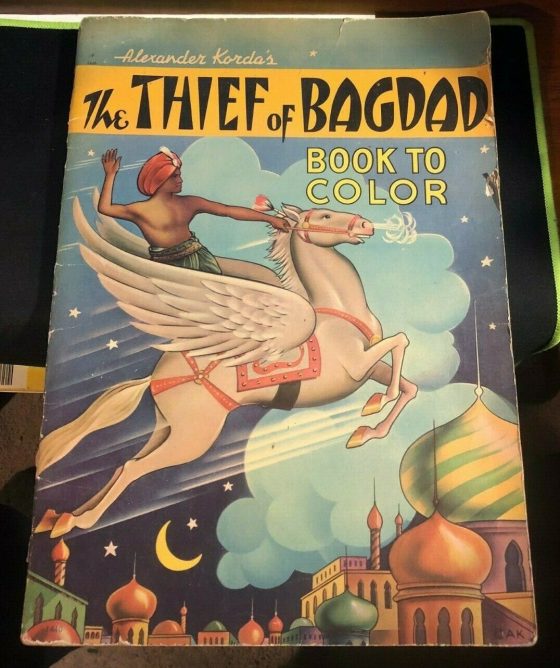
The Thief of Bagdadwith may not be Michael Powell’s best film. We more remember him for the such classics as The Red Shoes and Black Narcissus, teamed up of course with his close colleaugue and friend Emeric Pressburger.
He first collaborated with Emeric on ‘The Spy in Black’ and I remember a story that Michael Powell himself told about his first meeting with Emeric Pressburger in AlexanderKorda’s stately office at Denham in the old house. Mr Korda asked Emeric, who Michael Powell didn’t know at all at the time, to read out a summary of the screen play that he had written for this film. On hearing it, Michael said that the author nearly fell off his chair whilst Korda remained sitting calmly watching the other’s reactions. Michael Powell thought it was brilliant – Emeric Pressburger had turned the story on its head , changed a man to a woman and so on – and Michael Powell thought ‘this man is a genius – I must work with him again’ – and the rest, as they say, is history.
John Justin a young actor made his film debut in this one – he was a classic handsome leading man of the era and Alexander Korda chose him and liked him
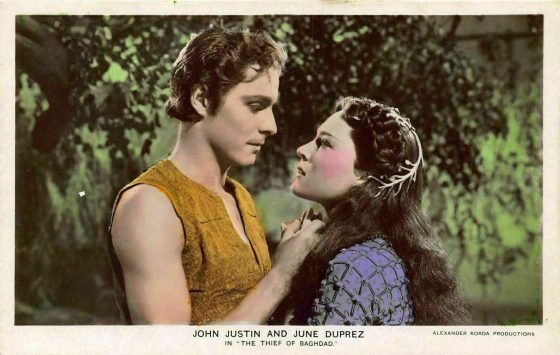
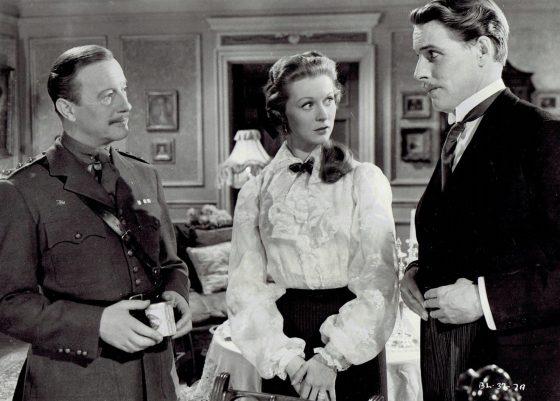
The most compelling character, as he should be, is the villain Jaffar, played by the German actor Conrad Veidt with hypnotic eyes and a cruel laugh. The beautiful heroine is a princess desired by both men, is played by June Duprez.
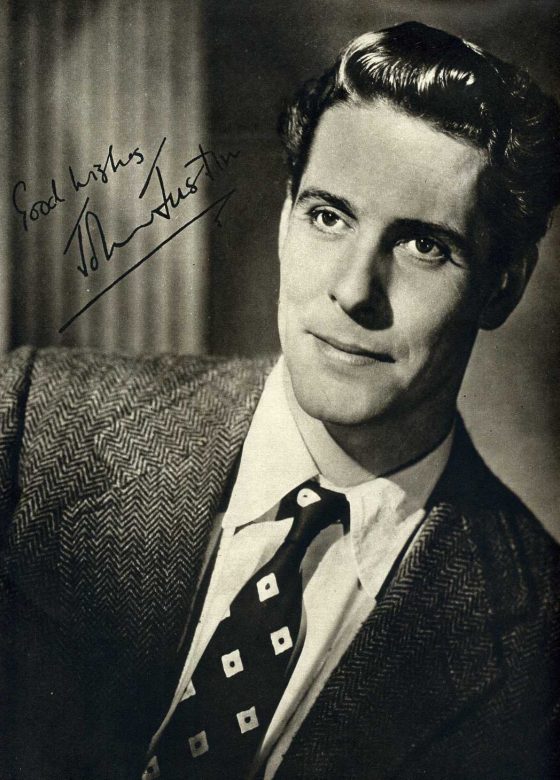
John Justin – Obituary from The Independent (UK)
John Justinian de Ledesma (John Justin), actor: born London 24 November 1917; married first Pola Nirenska (died 1992; marriage dissolved), second 1952 Barbara Murray (three daughters; marriage dissolved 1964), third 1970 Alison McMurdo; died London 29 November 2002.
A handsome actor with lean, matinée-idol looks in the style of Ivor Novello and Rex Harrison, John Justin will forever be associated with the first major role he played on screen, that of Prince Ahmed in the opulent Korda production The Thief of Bagdad. His film career, interrupted by the Second World War, was never as illustrious as that start promised, and he concentrated more on the theatre, where he had a long if variable reign as a star.
Born John Justinian de Ledesma in Knightsbridge, London, in 1917, he was the son of an Argentinian rancher and he spent much of his childhood in South America. He returned to England to be educated at Bryanston in Dorset but at 16 he left college and defied his father’s wishes by joining Plymouth Repertory Company. His grandmother payed for him to be trained at Rada, after which he joined John Gielgud’s repertory company for a season at the Queen’s Theatre in 1937, appearing in Richard II, The Merchant of Venice and The School for Scandal. The following year he played Hugh Randolph on stage in Dodie Smith’s delightful comedy drama about a large family, Dear Octopus (1938) and was the footman in The Importance of Being Earnest (1939).
He made his screen début with a bit role in the spy story Dark Journey (1937), produced by Alexander Korda and starring Vivien Leigh and Conrad Veidt, but his major break came when Korda cast him as the dashing hero in The Thief of Bagdad (1940). Though credited to three directors, the film was primarily the vision of its producer, Alexander Korda. “He controlled it totally,” said Justin, “and, effectively, he directed it.”
One of the most magical fantasy films ever made, with breathtaking sets designed by Vincent Korda, The Thief of Bagdad was a tremendous success. Korda originally wanted Jon Hall and Vivien Leigh to play the leading roles, but neither was available, so Justin and June Duprez won the parts. Alongside the portrait of venomous evil by Conrad Veidt and the exuberant enthusiasm of young Sabu, the pair made an engaging couple, with Justin’s aristocratic bearing, athleticism and melodious voice were assets that served him well as the story-book hero.
War broke out during production, but Justin was allowed to finish the film before starting service as a pilot in the RAF. Later he was given time off to appear in two propaganda films, providing brief love interest in Leslie Howard’s tribute to the women’s army, The Gentle Sex (1943), and playing a cameo role in Journey Together (1945), which promoted co-operation between British and American airmen.
After war service, he returned to the stage, perfectly cast as Robert Browning in The Barretts of Wimpole Street (Richmond, 1945) and playing Admetus in The Thracian Horses (Lyric, Hammersmith, 1946), a mock-Greek comedy co-starring Eileen Herlie. In the 1948 Stratford-upon-Avon season Justin’s several roles included lauded performances as Horatio to Paul Scofield’s Hamlet, Paris in Troilus and Cressida and Cassio in Othello. At the Scala Theatre in 1949 he played Mr Darling and Captain Hook in Peter Pan.
For Korda’s company, London Films, he appeared in The Angel with the Trumpet (1950), a sad tale of thwarted love and Nazi persecution starring Eileen Herlie. Justin told the writer Brian McFarlane,
Eileen wasn’t right for the part and the picture failed. It was the first time I played a role which aged from 22 to 75 – but not the last.
He had one of his best screen roles as a test pilot in David Lean’s The Sound Barrier (1952), sharing some notably tender scenes with Dinah Sheridan as his wife. In an enjoyable if implausible comedy thriller Hot Ice (1952), Justin co-starred with Barbara Murray, who became his second wife the same year (he had formerly married the Polish dancer, seven years his senior, Pola Nirenska). The couple had three daughters, but divorced in 1964.
20th Century-Fox offered Justin a non-exclusive contract in 1953 and he played major supporting roles in several films the studio made in the then-new CinemaScope process. In Henry King’s stirring adventure story King of the Khyber Rifles (1953), Justin was Tyrone Power’s rival for the hand of the General’s daughter (Terry Moore) and maliciously reveals that Power is a half-caste.
Justin was teamed again with King and Power in Untamed (1955), advertised by the studio as “Africolossal!”. As the husband of Susan Hayward, Justin is killed in a Zulu attack, leaving the way clear for Hayward and Power to get together. In Robert Rossen’s Island in the Sun (1957), a tedious film which became a hit due to its Caribbean locations and its controversial treatment of interracial romance, Justin was teamed romantically with Dorothy Dandridge.
Between Fox assignments Justin had starring roles in the theatre, though plays such as Miss Hargreaves (1952), with Margaret Rutherford, and the Hollywood satire Olive Ogilvy (1957) with Yolande Donlan, were not very successful.
He had a challenging star role in the film The Man Who Loved Redheads (1955), in which he again aged from a young man to an old one. Adapted by Terence Rattigan from his own play Who is Sylvia?, it told of a man who has four great loves during his life and they all look the same. Co-starring Moira Shearer as the four women, it was not a happy production – the producer Alexander Korda and director Harold French argued throughout the shooting and French later said,
I shouldn’t have done it. I knew it was a bad script but it was partly love of Rattigan that made me do it. I felt it was under-cast. I got on all right with Moira but I didn’t think she was quite strong enough. You couldn’t meet a nicer man than John Justin, but I really wanted Kenneth More.
It was a film that Justin recalled with affection:
The film didn’t go down well, but I liked it. There were some wonderful comic actors and some very nice moments.
In 1959 Justin joined the Old Vic company, and played Mellefont to Maggie Smith’s Lady Plyant in The Double Dealer, Orlando in As You Like It, John Worthing in The Importance of Being Earnest and King Richard in Richard II. The following year he made his first appearance on Broadway, as Lieutenant Boyd in Little Moon of Alban.
At the Open Air Theatre in Regent’s Park he was a flamboyant Don Pedro in Much Ado About Nothing (1963) and he spent a season (1963-64) in The Mousetrap at the Ambassador’s Theatre. He tackled the demanding role of Willy Loman in a revival of Arthur Miller’s Death of a Salesman in repertory in Northampton (1965), and he played both Prince Escerny and Puntschu in Peter Barnes’s adaptation of Wedekind’s play Lulu (1970), which moved from Nottingham to the Royal Court and then the West End. In 1974 he toured as Winston Churchill in A Man and his Wife and as Mr Laurence in Little Women, and the following year he went to West Germany to give recitals of Blake and Shakespeare for the British Council.
His later film roles included three for director Ken Russell – small parts in Savage Messiah (1972), Lisztomania (1975) and Valentino (1977). In Michael Winner’s remake of The Big Sleep (1980) he played the effete bookstore owner and murder victim Arthur Geiger, and his last film was Disney’s limp comedy thriller Trenchcoat (1983).
By most film fans, though, he will be remembered as the athletic, devil-may-care hero of The Thief of Bagdad.
Conrad Veidt had a long and very successful career in the cinema – I mainly think of him in ‘The Passing of the Third Floor Back’ made in England in 1935 where he plays the stranger who moves in to a block of slum like flats where there is much unhappiness and nastiness among the people who live there. The stranger brings peacefulness to them and by the time he disappears things have changed dramatically – I love this film
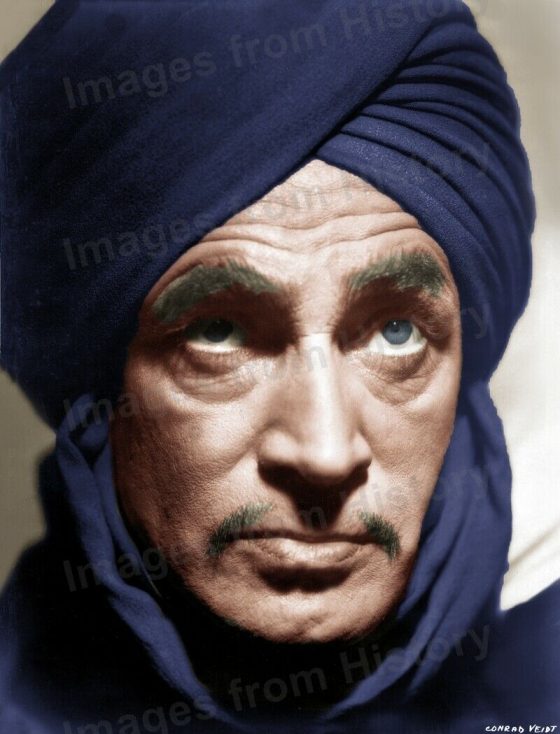
ABOVE – Conrad Veidt in The Thief of Bagdad
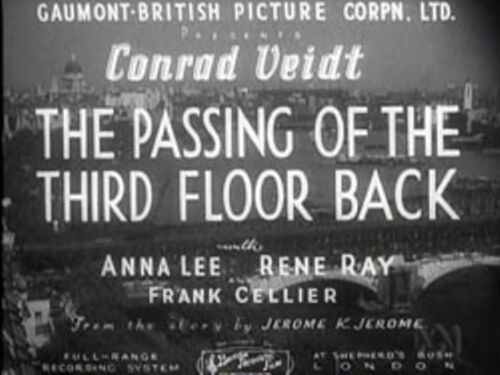
Back to the The Thief of Bagdad :-
The story seems to move from one spectacular special-effects sequence to another: the Sultan’s mechanical toy collection. The flying horse. The storm at sea. The goddess with six arms. The towering genie released from a bottle. Abu’s assault on the temple that contains the All-Seeing Eye. His climb up a mountainous statue. The battle with the gigantic spider. The flying carpet. At the time these special effects when viewed on that large cinema screen would have been unbelievable – and so so impressive – they even are today on the smaller TV screen
The film was a breakthrough in technique and vision and went a long way to shaping the film future for this type of adventure story
The Thief of Bagdad mixes the best of those classic tales in a nice even mixture of fantasy and swashbuckling action to deliver a unique film that still is as enchanting and thrilling as it was all those years ago.
… [Trackback]
[…] Find More here on that Topic: filmsofthefifties.com/the-thief-of-bagdad-1940-from-alexander-korda/ […]